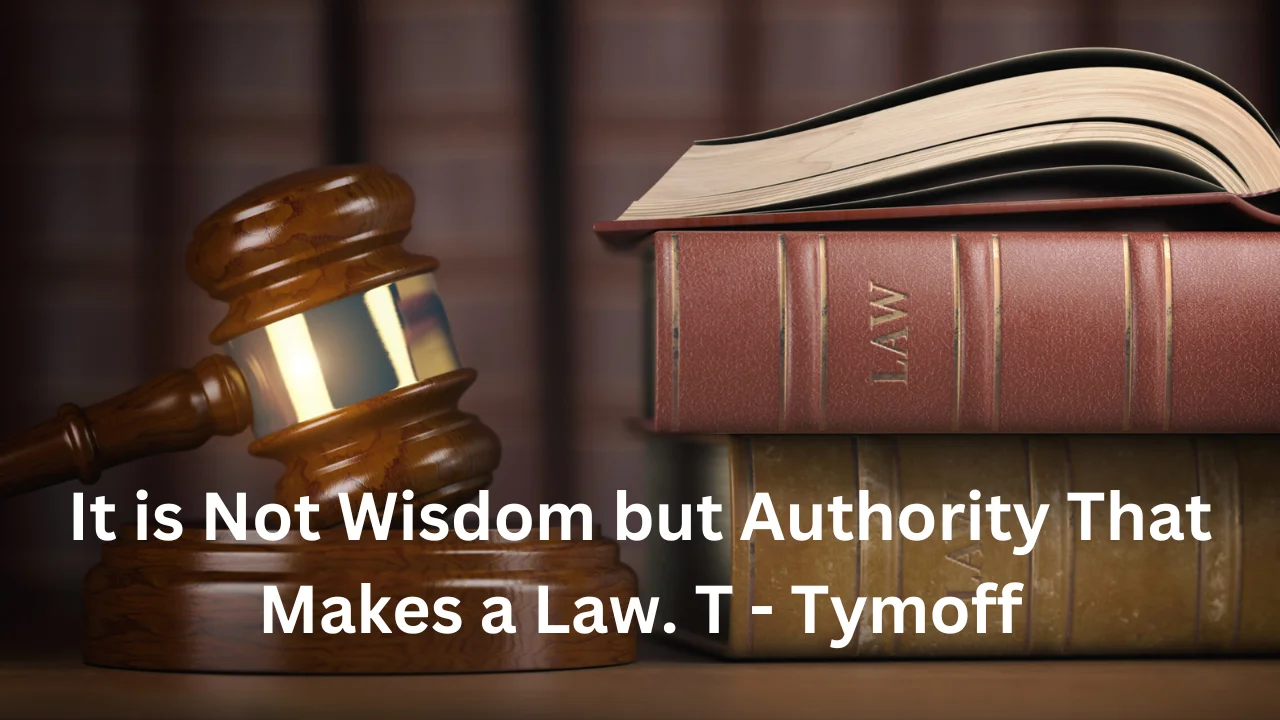It is not wisdom but authority that makes a law. t – tymoff, The quote “It is not wisdom but authority that makes a law” attributed to Tymoff provokes thought and contemplation about the nature of law, its origins, and its role in society. This statement underscores a critical question: Is the creation and enforcement of laws driven more by the wisdom of the lawmakers or the authority vested in them? In this article, we delve into Tymoff’s perspective, analyze the dynamics of law, and explore the implications of prioritizing authority over wisdom in the legislative process.
The Origin of the Quote
To begin our exploration, it’s important to understand the context and origins of the quote. Tymoff, while not a well-known historical figure, is believed to be a fictional character who represents a collective sentiment about the relationship between wisdom and authority in the context of law. This perspective encapsulates a broader philosophical debate about the source and justification of laws in society.

Authority vs. Wisdom: Defining the Terms
Before we delve deeper into the quote’s implications, it’s essential to clarify the terms “authority” and “wisdom” in the context of law:
Must Read=Emma argues with principal figgins
Authority: Authority, in this context, refers to the power and legitimacy vested in individuals or institutions to create, enforce, and interpret laws. This authority may be derived from governmental structures, legal traditions, or democratic processes.
Wisdom: Wisdom, on the other hand, denotes the quality of sound judgment, experience, and ethical insight in the creation and interpretation of laws. Wisdom implies a deep understanding of the complexities of human behavior and societal dynamics.
The Role of Authority in Law
Authority is a foundational aspect of any legal system. It is the mechanism by which laws are enacted, upheld, and enforced. In democratic societies, the authority to create and change laws typically rests with elected representatives, who derive their power from the people they serve. This delegation of authority is based on the fundamental principle of representative democracy.
The authority of lawmakers is also essential in maintaining order and justice in society. Laws provide a framework for resolving disputes, protecting individual rights, and promoting the common good. Without the authority to establish and enforce laws, societies would struggle to maintain cohesion and security.
The Role of Wisdom in Law
Wisdom, as the quote suggests, plays a vital role in the quality and effectiveness of laws. It is through wisdom that lawmakers navigate the complexities of human behavior, societal norms, and ethical considerations. Wisdom involves a deep understanding of the consequences of laws, the potential for unintended outcomes, and the need to balance competing interests.

Incorporating wisdom into the legislative process leads to more equitable and just laws. Wise lawmakers consider the long-term impact of their decisions, the potential for discrimination or inequality, and the preservation of fundamental rights and liberties. Wisdom is the driving force behind laws that reflect the values and aspirations of a just society.
The Debate: Authority vs. Wisdom
Tymoff’s statement encapsulates a debate that has existed throughout the history of legal and political philosophy. On one side, there is the argument that laws are primarily a product of authority, often reflecting the will of those in power. In such cases, the wisdom of lawmakers may be secondary, leading to laws that serve political interests rather than the common good.
Conversely, there is the perspective that wisdom should be the guiding principle in creating and enforcing laws. This approach places a premium on the ethical and moral dimensions of law, emphasizing the need to make just and equitable decisions, even if it means challenging existing power structures.
The Implications
- Rule of Law: The tension between authority and wisdom in the creation of laws has significant implications for the rule of law. When authority is given precedence over wisdom, it can result in laws that lack ethical foundations, leading to issues of fairness and justice.

- Checks and Balances: The debate underscores the importance of checks and balances in a legal system. These mechanisms, whether through separation of powers or judicial review, serve as safeguards to prevent the misuse of authority in the creation of unjust laws.
- Democratic Governance: In democratic societies, the relationship between authority and wisdom in law becomes especially relevant. It is the responsibility of citizens to elect representatives who embody wisdom and who can be trusted to create just laws.
- Legal Reform: When the gap between authority and wisdom in law becomes evident, it often prompts calls for legal reform. Public movements, advocacy groups, and legal experts work to align laws with ethical and moral standards, reinforcing the importance of wisdom in the legislative process.
- Ethical Considerations: The quote also highlights the ethical considerations that should guide lawmakers. It reminds us that the wisdom of making just laws should be the foundation of any legal system.
Case Studies: Authority vs. Wisdom in Law
To better understand the implications of the debate, let’s consider a few case studies where the tension between authority and wisdom has played a significant role:
- Prohibition in the United States: The prohibition of alcohol in the United States during the 1920s and early 1930s was an example of laws driven more by authority than wisdom. While the intention was to reduce social problems, the wisdom of understanding human behavior and the consequences of a ban on alcohol was overlooked. This led to a surge in organized crime and black-market alcohol, ultimately resulting in the repeal of the laws.
- Civil Rights Movement: The Civil Rights Movement in the United States was a triumph of wisdom over mere authority. Laws that sanctioned racial segregation and discrimination were challenged by civil rights activists who argued for the wisdom of justice, equality, and human rights.
- Environmental Regulations: Environmental laws and regulations worldwide often reflect the importance of wisdom. The need to preserve natural resources and mitigate harm to the planet necessitates a deep understanding of ecological systems and long-term consequences.

- Freedom of Speech: The balance between authority and wisdom is evident in laws related to freedom of speech. While the authority to regulate speech may exist, the wisdom of protecting this fundamental right is paramount to maintaining democratic values.
Conclusion
Tymoff’s statement, “It is not wisdom but authority that makes a law,” raises profound questions about the nature of law, governance, and ethics. While authority is essential for creating and enforcing laws, wisdom should guide the process to ensure that laws are just, equitable, and serve the common good.











